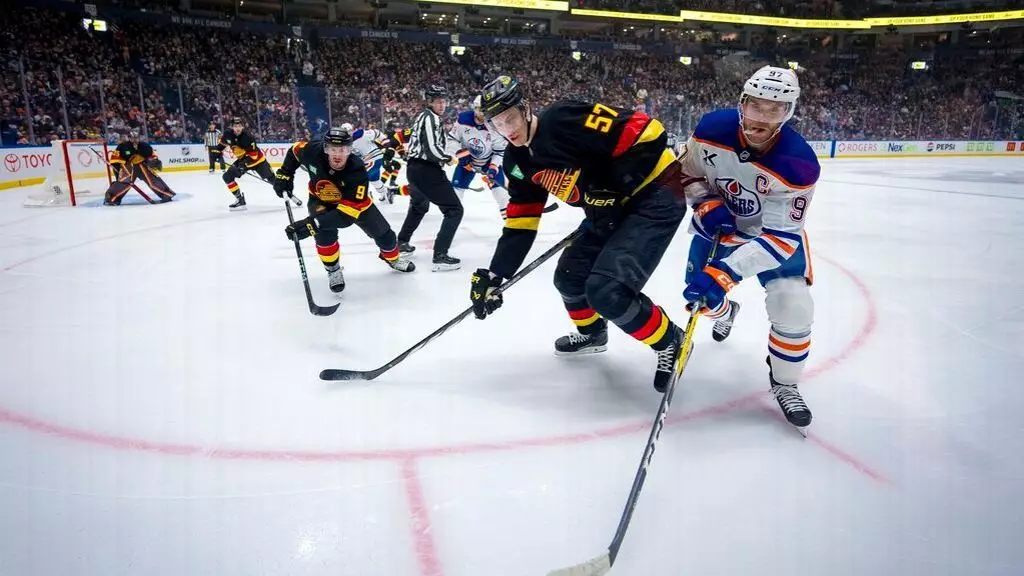The recent suspensions of Edmonton Oilers superstar Connor McDavid and Vancouver Canucks defenseman Tyler Myers have sparked considerable debate in the NHL community. Following a heated matchup that showcased tense moments and physical play, both players received three-game suspensions for cross-checking opponents in the head. This marks a significant moment in McDavid’s career and raises questions about discipline in the league, player safety, and the toll of frustration in high-stakes scenarios.
For Connor McDavid, this suspension is unprecedented. Emerging as one of the most dominant players in hockey, McDavid has garnered accolades including three Hart Trophies as league MVP and a Conn Smythe Trophy for his playoff performance last season. Yet, the three-game ban he received on Saturday night represents the harshest disciplinary action he’s faced in his ten-year career. This suspension doesn’t only alter his immediate playing schedule; it also has implications for the Oilers as they prepare for crucial upcoming games.
In the heat of the game against the Canucks, a moment of frustration took over. With the clock winding down and the Oilers trailing, McDavid found himself in a physical tussle with Vancouver’s Conor Garland. After a series of interactions that escalated tensions, McDavid retaliated with a cross-check aimed at Garland’s head. This act, while perhaps a moment of frustration, was thoroughly reviewed by the NHL’s Department of Player Safety, which deemed it intentional and worthy of suspension.
The concerns about player safety are paramount in the NHL, especially when dealing with head contact. Experts stress that any action resulting in a hit to the head needs strict scrutiny, as such play can lead to lasting injuries that inhibit a player’s career. The NHL’s stance reflects a growing movement to protect players from preventable risks, and McDavid’s actions serve as a reminder of the challenges athletes face, not just from opponents but also from the consequences of their own reactions.
Tyler Myers finds himself in a somewhat similar predicament. His cross-check on Oilers defenseman Evan Bouchard also drew the attention of the league, culminating in a three-game suspension. This incident, which occurred shortly after McDavid’s, exemplifies the physicality and emotional intensity inherent to NHL games. As Bouchard approached Myers, a cross-check to the head followed, prompting an outcry for consistent enforcement of rules regarding head contact.
Myers contended that he did not aim to deliver a headshot, a common defense among players facing disciplinary action. However, the Department of Player Safety disagreed, emphasizing that the action was intentional and aggressive. The ruling illustrates the league’s commitment to curbing dangerous forms of play, which is essential for protecting players’ health.
It’s difficult not to view these suspensions as part of a larger narrative within the NHL, where physical confrontations often veer into dangerous territories. In a league teeming with fierce competition, the need for mental fortitude is paramount. Players are tested not just against opponents but also against their impulses in high-pressure moments. Reflecting on such scenarios, Myers’ and McDavid’s actions underline a broader issue of retaliation: how top-tier players cope with frustration and aggression and the potential fallout from crossing ethical boundaries.
The ramifications of these suspensions extend far beyond just McDavid and Myers. Both players are significant figures on their respective teams; McDavid is a key to the Oilers’ offensive machinery, while Myers has been a stalwart on the Canucks’ defense. Their absences will be felt, particularly as both teams seek points and standings in a competitive stretch of the season.
Moreover, the suspensions initiate discussions about the balance of physicality and safety in the NHL. The rules around player discipline continue to evolve as the league seeks to promote a safe playing environment. As the game becomes faster and more intense, players are left to navigate these challenges while maintaining the integrity of the sport.
The three-game suspensions handed to Connor McDavid and Tyler Myers serve as a critical reminder of the responsibilities players have on the ice. As the league grapples with enhancing player safety and maintaining the excitement of the game, it relies on athletes to understand the consequences of their actions. The incidents involving McDavid and Myers are not merely situations of punishment; they are focal points for a broader conversation about competition, discipline, and the lasting effects of aggressive play in professional hockey.

